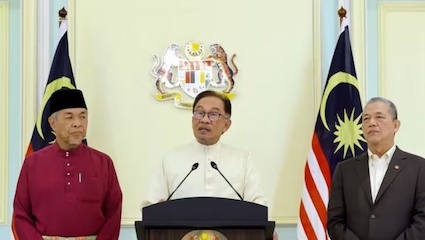Anwar’s struggle to maintain political stability in Malaysia

From the get-go, there have been questions about how long Malaysia Prime Minister Anwar Ibrahim’s unity government would be able to survive. Nearly six months into the job, his position remains shaky, says CNA’s Leslie Lopez.
Nearly six months into his premiership, Malaysia Prime Minister Anwar Ibrahim continues to wrestle with persistent speculation over the many plots to unseat his government.
Mr Anwar was sworn in as prime minister on Nov 24 last year, with many twists and turns that finally resulted in a unity government comprising Pakatan Harapan, previous ruling coalition Barisan Nasional, Gabungan Parti Sarawak, Gabungan Rakyat Sabah and Parti Warisan.
From the get-go, there were questions about how long his unity government would survive.
In recent weeks, chatter about plots to topple the government has gone into overdrive, with Mr Anwar acknowledging a conspiracy but expressing confidence that it will remain intact until the next general election.
He reiterated during the unity government convention on Sunday (May 14) that his administration is stable.
So, is the Anwar administration out of the woods yet?
“ENOUGH IS ENOUGH”
From a numbers standpoint, the seemingly clumsy PH-led coalition that came together on the prodding of Malaysia’s King Sultan Al-Sultan Abdullah Sultan Ahmad Shah is probably the most stable that Malaysia has seen since the 2018 general election, which saw three different governments enter and exit the country’s political revolving door. This is the first time in 15 years that the ruling coalition enjoys a two-third majority in parliament.
The political machinations of one-time political strongman Dr Mahathir Mohamad also do not appear to be attracting any traction, and the opposition headed by former premier Muhyiddin Yassin is on the ropes dealing with a widening campaign by the Malaysian Anti-Corruption Commission over allegations of graft in the award of billions of dollars in government contracts.
Speculation that more than 10 Members of Parliament from the United Malays National Organisation (UMNO) could resign to force by-elections that would serve as a kind of referendum on the Anwar premiership has also fizzled out.
Another little-discussed factor providing the Anwar government with the momentum is the strong backing he continues to receive from the country’s monarchy, the nine Royal households that have become crucial arbiters in the country’s messy politics.
The outspoken Johor ruler Sultan Ibrahim Ibni Almarhum Sultan Iskandar lashed out recently over the “incessant reports regarding the stability of the current (Malaysia) government”.
“Enough is enough. How long must the 30 over million people of our country endure this situation?” he was quoted as saying in media reports.
PRISONER TO POLITICAL ALLEGIANCES
Yet, longevity issues continue to plague the Anwar administration, largely due to the adverse public perception stemming for the realities of coalition politics.
Mr Anwar, 75, is now finding himself a prisoner to his current political allegiances, ties he was left with little choice but to accept in order to secure the premiership.
The chief annoyance for many PH supporters is over how Mr Anwar is being forced to accept compromises that have strayed from pre-election pledges after accepting UMNO as a partner in the coalition and appointing its president Ahmad Zahid Hamidi, who is currently battling corruption charges in the courts, as one of his deputies in government.
UMNO politicians occupy high-profile portfolios in Mr Anwar’s Cabinet, including top leadership spots in the Defence and the powerful Rural and Regional Development Ministry, positions that in turn have allowed the party’s top brass to reward their supporters with appointment to government agencies, a long-established practice of political favouritism that the PH coalition had pledged to end if it came to power.
There is also unease that the reform agenda Mr Anwar promised has been moving slowly. His reluctance to bring reform in the civil service and regulatory agencies with fresh appointment are also delivering mixed signals.
For example, Mr Anwar’s recent decision to retain the chief commissioner of the Malaysian Anti-Corruption Commission, Azam Baki, for another year has stirred consternation within his own coalition and non-governmental organisation.
The Centre to Combat Corruption and Cronyism (C4) chided Mr Anwar over the move to extend Mr Azam’s contract for another year after he had reached his mandatory retirement age early this month. Mr Azam’s position had come under a cloud last year over questions in his ownership of shares in private companies.
“The extension is not a good step, when in fact it’s a spoke in the wheel for Anwar’s crusade against corruption,” C4 president Cynthia Gabriel was cited as saying in local media.
Mr Anwar has defended his position, arguing that he wanted to break the convention that a change of guard in an agency was necessary when a new premier is appointed.

